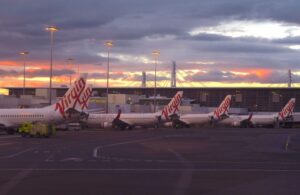Virgin Australia’s IPO: A New Dawn Amidst Recovery
Virgin Australia is poised for its long-awaited return to the stock market after a five-year hiatus, launching a significant initial public offering (IPO) valued at A$685 million ($443 million). This groundbreaking move comes on the heels of a resurgence in domestic tourism, presenting a promising opportunity for investors.
Key Details of the Offering
The IPO marks Australia’s largest deal to date in 2023, as Bain Capital, the private equity firm that acquired Virgin for A$3.5 billion during its voluntary administration in 2020, prepares to scale back its stake from approximately 70% to 39.4%. Notably, Qatar Airways, which added to its investment in Virgin, will hold a 23% share post-IPO.
The initial pricing is set at A$2.90 per share, effectively valuing the airline at A$2.32 billion on a fully diluted basis. The success of this offering is being closely monitored, acting as a litmus test for the consumer spending outlook in Australia.
The Road to Recovery
Despite its challenges during the COVID-19 pandemic, Virgin Australia is navigating its revival with strategic moves. The airline has streamlined its operations, particularly in cutting back its international routes, but is now ready to reinvigorate long-haul flights in collaboration with Qatar Airways, planning 28 new weekly return services between Doha and major Australian airports.
In March, domestic carriers transported 5.1 million passengers, although this reflects a slight decline year-over-year. However, it marks a remarkable recovery from the depths of the pandemic, highlighting a resurgence in travel demand. Factors contributing to this momentum include recent interest rate cuts, which have bolstered consumer confidence and spending, leading to record-high shares for rivals like Qantas.
According to Simon Elsegood, head of research at the CAPA Centre for Aviation, the ongoing local demand, paired with slow capacity growth and decreased competition, has lent Virgin Australia an advantageous position. The exit of competitors like Bonza and Regional Express (REX) from the mainline jet market has further solidified Virgin and Qantas’s stronghold in the domestic arena. As of March, Virgin’s domestic market share stands at 34.4%, closely trailing Qantas’s 37.5%.
Investor Sentiment
Bids from investors prior to the book-building process have shown enthusiastic support for the offering, with indications that they may cover the deal’s size. The front-end book-building process allows institutional investors to submit their bids ahead of the prospectus receiving approval from Australian regulators.
With the IPO expected to launch on June 24, it stands as the largest in the nation since the A$2 billion DigiCo Infrastructure REIT offering in December, albeit under a cloud given DigiCo’s subsequent 30% decline in share value.
Market Implications
This is not just a pivotal moment for Virgin Australia but also an important indicator of the broader recovery in Australia’s aviation and tourism markets. A successful IPO would signal robust investor confidence and could catalyze further investments in the sector.
At Extreme Investor Network, we believe that understanding these movements in the stock market is crucial for making informed investment decisions. As Virgin Australia makes its return, keeping an eye on market trends and consumer confidence becomes key for every savvy investor.
Stay tuned for more insights and analyses as this story unfolds, and discover the potential opportunities and challenges ahead in the ever-evolving landscape of finance and investment.

